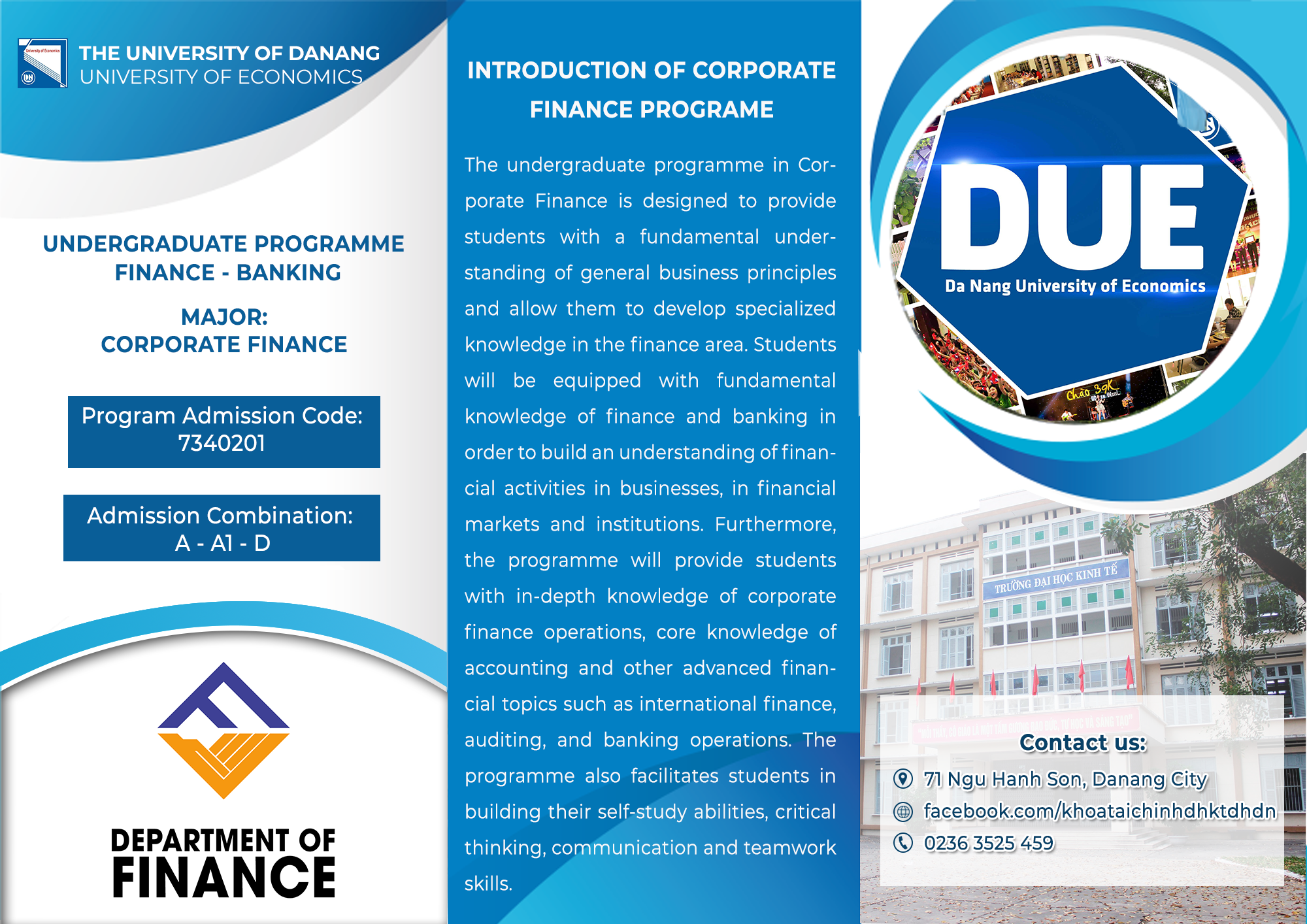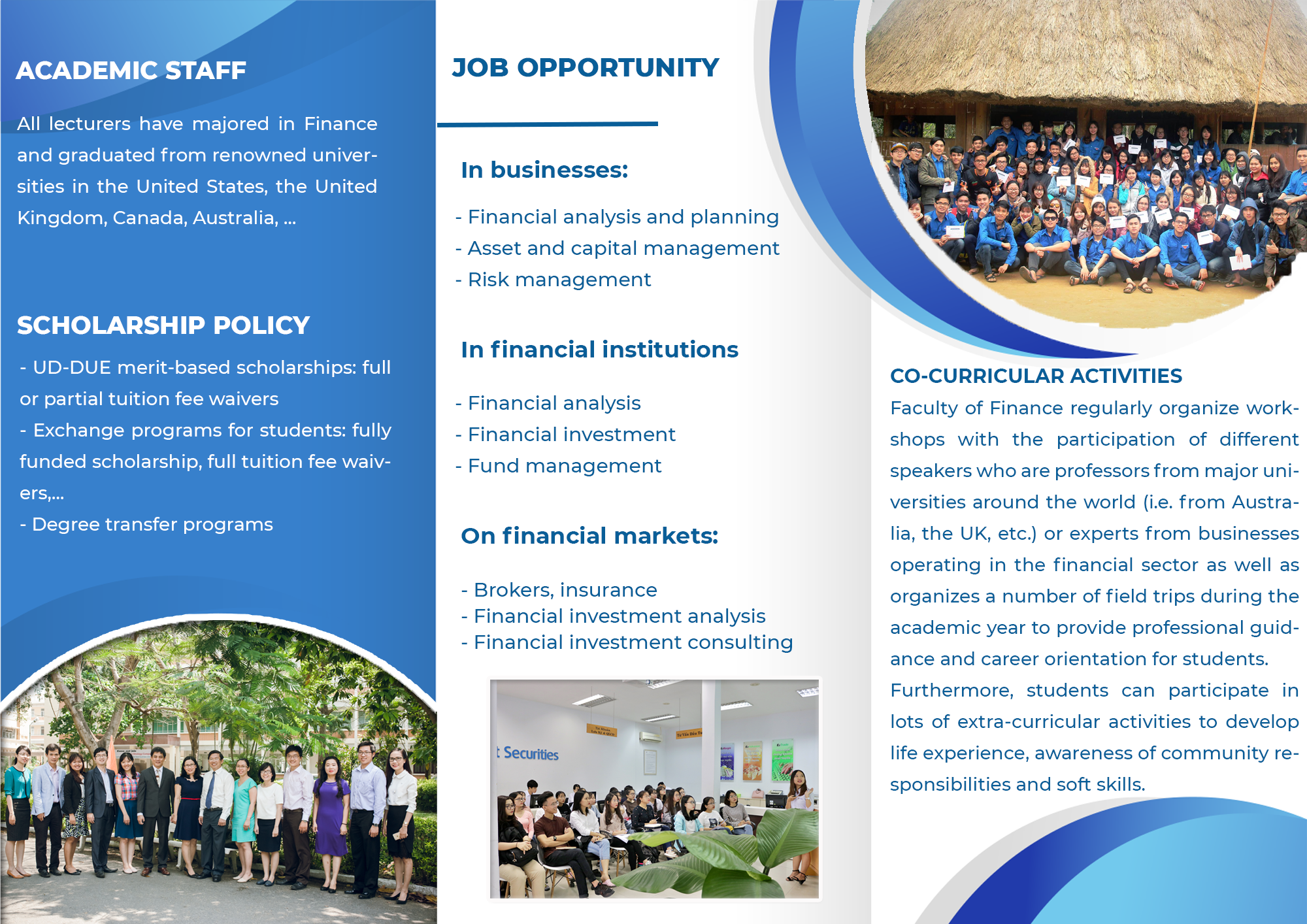Corporate Finance


General information
1. Program title: Finance - Banking
2. Major: Corporate Finance
3. Level: Undergraduate
4. Type of degree: Bachelor of Finance
5. Mode of study: Full time
6. Study duration: 3-6 years (normal duration is 4 years)
7. Total of credits: 134
8. Faculty: Faculty of Finance - University of Economics (UD-DUE)
9. Language: Vietnamese, English
10. Website: https://due.udn.vn/vi-vn/khoa/tai-chinh
11. Facebook: https://www.facebook.com/khoataichinhdhktdhdn
Programme Outcomes (POs)
After graduation, Corporate Finance students will be able to:
- Become financial consultants, managers or executives in businesses and other organizations (PO1)
- Become investors who can make independent financial decisions (PO2)
- Engage in lifelong learning to adapt to rapidly changing economic and financial environments (PO3)
Programme Learning Outcomes (PLOs)
A Programme is designed with the aim of motivating students to comprehensively develop their knowledge, skills and attitudes. Graduating from Corporate Finance programme, students have ability to:
PLO1: Apply fundamental knowledge of economics and business to corporate management
PLO2: Apply knowledge of financial system to solve practical issues
PLO3: Analyze corporate finance
PLO4: Evaluate financial decisions and trading opportunities in financial markets
PLO5: Organize financial management activities in various organizations
PLO6: Perform effectively teamwork skill
PLO7: Perform effectively communication skills
PLO8: Demonstrate English proficiency in working environment
PLO9: Apply information technology in working environment
PLO10: Apply financial skills to decision-making in a variety of business situations
PLO11: Demonstrate a commitment to standards in professional codes of ethics and social responsibilities
International joint training opportunities
The joint-training programs: the CF programme is widely recognized by both dosmestic and international universities, such as Westphalian University of Applied Science (Germany), University of Cardiff (UK), Heriot-Watt University (UK), Saxion University (Netherlands), Valencienne University (France), Massey University (New Zealand), Cork Institute of Technology (Ireland). Following this recognition, UD-DUE has signed agreements that allow students to apply joint training programs such as 3+1, 2+2 with those prestigious universities. Students will study phase 1 (2-3 years) at UD-DUE, then transfer to phase 2 (1 or 2 years) and graduate at partner universities abroad in the training system of UD-DUE.
Exchange programme: the logical structure of the CF’s curriculum and updated teaching and assessment activities compatible with PLOs do not only offer CF students the opportunities to acess joint-trainning programme, but also make it easier for students to apply for student exchange programs with the montioned universities, including Westphalian University of Applied Science (Germany), Heriot-Watt University, UCAM - Universidad Católica San Antonio de Murcia (Spain), Saxion University (Netherlands), Valencienne University (France), Massey University (New Zealand), Cork Institute of Technology (Ireland).
Career Outcome and higher education after graduation
Graduates from UD-DUE’s Corporate Finance programme, students can work at different financial related positions in various types of organizations and sectors.
Finance Executives or Financial Managers at various business forms: responsible for financial reports preparation, financial planning and analyst, capital budgeting, assets management, financial decisions making, asset management, working capital management, cash management, risk management, merger, and acquisitions activity.
Financial Consultants at Financial Institutions: responsible for credit management, risk management, customer relations, product development and financial services in different forms of financial institutions, such as Commercial Banks, Mutual Funds, Finance Companies, Security Companies, Insurance Companies.
Financial Consultants or Researchers at Government sectors or non-profit organizations: responsible for capital budgeting, investment and financing decisions making, taxes and related regulations.
Furthermore, CF students are well equipped to pursue post-graduate programs in Finance and related fields.